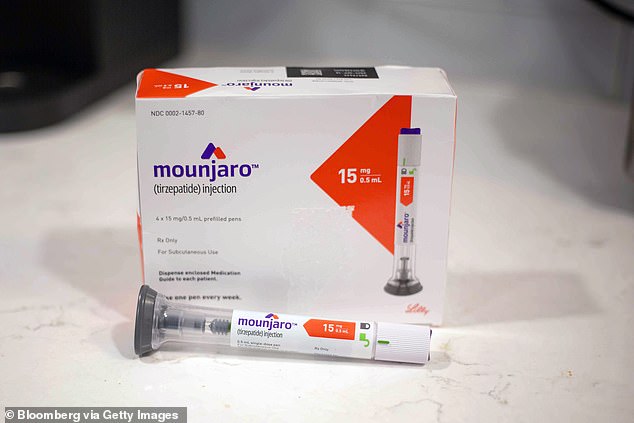Women taking oral hormone replacement therapy (HRT) are being advised to talk to their doctor if they also start using the weight-loss jab Mounjaro, amid concerns they could be at a higher risk of womb cancer.
Meanwhile, there are fears that women getting hold of Mounjaro online – rather than through their GP – will be unaware of the potential risk.
HRT provides oestrogen to ease menopause symptoms such as hot flushes, low mood and reduced sex drive.
Because oestrogen thickens the lining of the womb, which can increase the risk of it becoming cancerous, it is combined with progesterone, or a progestogen (a synthetic version of progesterone) in HRT to help keep the lining thin.
Many women take oestrogen in the form of a rub-on gel or skin patch – rather than orally – but progestogen in the form of a tablet which has to be absorbed into the bloodstream through the lining of the stomach.
The worry is that a reduction in the absorption of oral progesterone or progestogen as a result of taking Mounjaro could increase the risk of cancer of the womb.
And there is a different risk for women taking the oral contraceptive pill and the weight-loss jabs: an unplanned pregnancy.
The new obesity-fighting drugs contain semaglutide (brand names Wegovy and Ozempic) or tirzepatide (Mounjaro) – these work by slowing digestion (‘gastric emptying’), and can cause gastric symptoms such as nausea and vomiting, which may reduce the absorption of oral medication.

Doctors should consider raising a woman’s dose of oral progestogen when she starts on Mounjaro, says Professor Annice Mukherjee, a consultant endocrinologist
Now new guidelines from the British Menopause Society (BMS) warn Mounjaro could interfere with absorption of oral forms of HRT.
While the cancer risk is ‘theoretical’ only, doctors should consider upping a woman’s dose of oral progestogen when she first starts on Mounjaro, says Professor Annice Mukherjee, a consultant endocrinologist at Spire Healthcare in Manchester, who helped write the new guidelines.
This is when the effect on the absorption of oral pills is greatest (according to the Mounjaro patient leaflet).
The progestogen dose should then increase temporarily each time the dose of the weight-loss drug increases – to compensate for the additional effect on absorption. The BMS guidelines are aimed at women who take oral progestogen alongside oestrogen in gel or patch form.
(Among those on combined oral contraceptives, absorption of both oestrogen and progestogen are reduced and women who’ve had a hysterectomy are not included in the new guidelines, as they take only oestrogen.)
Professor Mukherjee told Good Health that the reduction of progestogen ‘is a particular issue for women living with obesity and diabetes [the conditions the new jabs are designed to treat] as they already have an increased risk of womb thickening and cancer’.
‘Patients suitable for Mounjaro should generally be offered transdermal oestrogen [eg gels or patches], which is considered mostly safe in women with diabetes and obesity, and not oral oestrogen, which can increase risks of blood clots.’
An alternative to increasing the dose of oral progesterone is to switch to a non-oral form of progesterone, such as the Mirena coil implant, or use a combined oestrogen-progestogen patch, says Dr Alice Scott, a menopause specialist at Essex Private Doctors.

New guidelines from the British Menopause Society warn Mounjaro could interfere with absorption of oral forms of HRT
Another potential consequence of reduced progestogen absorption is unexpected bleeding and spotting. Dr Scott, who has treated patients with the problem at her clinic, says she’s seen this in women who’ve bought slimming injections online without proper medical guidance.
‘My concern is that with it being so easy to get these medications online, women are not having adequate consultations before obtaining them,’ she says. ‘This means that advice about the effect of these medications on other oral drugs is not given.
‘There’s evidence that these weight-loss medications generally [ie not only Mounjaro] may also reduce the effectiveness of oral contraceptive pills which could increase the risk of pregnancy, so it is important for women using these to discuss this with their doctor, too.
‘The problem is many people do not disclose to their doctors that they are on Mounjaro or other weight-loss jabs, so it is important that healthcare providers directly ask patients at their medication reviews.’
Novo Nordisk, which makes Ozempic and Wegovy, recommends that the drugs are taken under medical supervision.
A spokesperson added: ‘No clinical trials have specifically looked at how HRTs and semaglutide interact. In other pharmacology trials, semaglutide did not affect the absorption of oral medications to any clinically relevant degree.’
But they added: ‘As semaglutide causes a delay of gastric emptying it may potentially impact the absorption of oral medication taken alongside it, as such, caution should be exercised when taking oral medications alongside semaglutide and should be discussed with your healthcare professional.’
Mounjaro manufacturer Eli Lilly said information given to healthcare professionals explains that ‘tirzepatide delays gastric emptying and thereby has the potential to impact the rate of absorption of concomitantly administered oral medicinal products’.
‘This effect is most pronounced at the time of tirzepatide treatment initiation,’ added a spokesman.
‘Patients should consult their doctor or other healthcare professional regarding the right treatment options or to report any side-effects they may be experiencing.’












